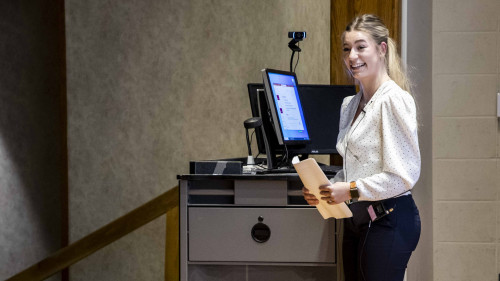The Stephens College School of Health Sciences hosted its third annual Spring Research Conference last week.
The conference featured a keynote presentation from one of the foremost leaders in women’s health research in the country, as well as more than 40 student podium and poster presentations.
Susan R. Johnson, MD, MS, recently retired as Professor Emeritus of Obstetrics and Gynecology and Epidemiology at the University of Iowa. Her keynote speech was “Women’s Health Research: Why, When & What?”
Dr. Johnson’s primary clinical and research interests have been in menopausal health. She was an investigator in the Women’s Health Initiative (WHI), a seminal clinical trial of menopausal hormone therapy. She continues to serve as Chair of the NIA/NINR funded Study of Women’s Health Across the Nation (SWAN), a multi-site longitudinal, epidemiological study designed to examine the health of women during middle age.
“We are turning the ‘black box’ of the menopause transition into a window of opportunity so we can encourage the adoption of healthy behaviors and design early preventive practices,” Dr. Johnson said.
Following Dr. Johnson’s keynote, senior pre-vet majors Sydney Harrison and Amanda Kujiraoka presented their research, which began last year during Stephens’ Summer Research Program.
Harrison’s research presentation was “Characterizing anatomy and predicting function of the male Florida soft-shell turtle phallic glans.” Kujiraoka’s presentation was “Impact of incubation regimes on genital differentiation in hatchling American alligators.”
Both students presented their research and answered questions from the audience, as well as from Dr. Johnson, who said she was very impressed.
Harrison has been accepted to the Kansas State University Veterinary School, where she plans to study mixed animal medicine and one day open her own veterinary clinic.
“The best thing Stephens has to offer is its support system,” Harrison said. “I can tell my teachers care about their students’ success.”
Kujiraoka, who hails from San Francisco, said she selected Stephens’ pre-vet program over other institutions.
“I knew that Stephens would set me up for success in getting into vet school,” she said.
Through Stephens, Kujiraoka was able to join the Summer Research Program, which allowed her to work closely with students and faculty at the University of Missouri Veterinary School. That positive experience led her to apply for admission at Mizzou, and she is thrilled to start there in the fall.
“Because of Stephens and the Summer Research Program, I got my foot in the door (at Mizzou) and it has eased the transition to vet school,” Kujiraoka said. Both students were mentored by Dr. Brandon Moore, associate professor of biology.
Dr. Johnson said the quality of research conducted by Harrison and Kujiraoka, as well as all the students presenting at the conference, was exceptional.
“Research is so critical to being an effective practitioner,” Dr. Johnson said, adding that students attending a women’s college have the advantage of feeling emboldened to voice their thoughts without interference from male classmates.
Dr. Julia Moffitt, dean of the School of Health Sciences, said the Spring Research Conference and Summer Research Program were established to provide students with opportunities to gain real-world experience, a significant advantage as they apply to professional and graduate schools.
Both opportunities reflect the mission of the School of Health Sciences, which is to prepare outstanding professionals to serve as leaders; exhibit critical and creative thinking skills; adhere to high ethical standards; and demonstrate the knowledge, skills, dispositions and cultural sensitivity required to contribute to the needs of an evolving and diverse society.
“We’re developing a new generation of clinicians and scientists who are doing the work to bring about more equitable solutions for all members of our society,” Dr. Moffitt said.
